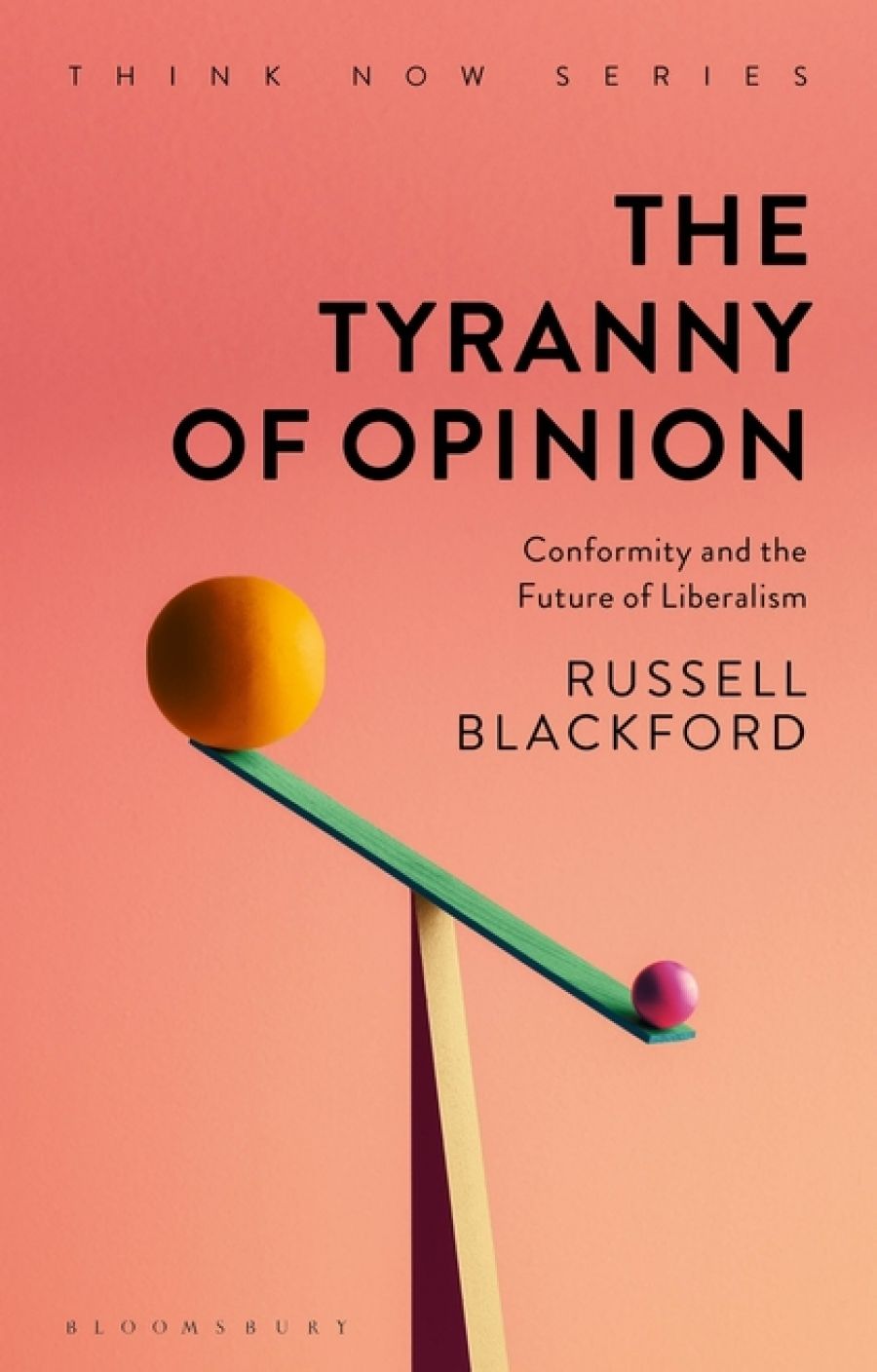
- Free Article: No
- Contents Category: Politics
- Custom Article Title: Ceridwen Spark reviews <em>The Tyranny of Opinion: Conformity and the future of liberalism</em> by Russell Blackford
- Custom Highlight Text:
Recently I was speaking with a friend about the impact of the #MeToo movement on gender politics and the implications for male academics. He suggested that there are only two speaking positions for men. The first is as a cheerleader from the sidelines. The second is as a critic, offering challenges or raising questions ...
- Book 1 Title: The Tyranny of Opinion: Conformity and the future of liberalism
- Book 1 Biblio: Bloomsbury, $43.99 pb, 256 pp, 9781350056008
Blackford is a philosopher, legal scholar, and literary critic at the University of Newcastle in New South Wales. In The Tyranny of Opinion, his fifth book since 2012, he draws on his obvious familiarly with, and appreciation for, the work of John Stuart Mill, author of On Liberty (1859). Mill famously said: ‘he who knows only his own side knows little of that’. Blackford’s willingness to explore, respectfully and without apparent prejudice, a range of views, examples, books, and thus ‘sides’ suggests that he holds the philosopher in some esteem. Blackford writes in ways that seek to demonstrate his commitment to learning about and trying to understand the values and beliefs of others, including those with whom he disagrees.
In the first substantive chapter, Blackford explores, and for the most part accepts, Mill’s approach to restricting individual liberty where this is required to prevent certain harms. He also discusses and appreciates Mill’s idea that government censorship and authority are not the only, nor even the main, threat to human liberty. Rather, as he argues: ‘Even more dangerous, perhaps, and certainly more difficult to understand or restrain, is a less overt, more insidious kind of tyranny; what Mill called “the tyranny of the prevailing opinion and feeling”.’ The following two chapters explore freedom of speech and some possible necessary limits to this, touching on defamation, hate speech, and invasive speech.
Having laid the intellectual and philosophical framework for his argument in the first four chapters, Blackford then focuses on the book’s main topic – namely the tyranny of prevailing opinion and feeling. It is here that the author really hits his stride. Though the foundational early chapters are scholarly and clear, there is an occasional whiff of recycled lectures. At times, reading them can feel like hard work. In contrast, the second half of the book comes alive with passion and rich examples, while also conveying Blackford’s evident grasp of other, often controversial literature pertaining to this discussion. Readers will learn, for example, about Angela Nagle’s Kill All Normies (2017), Alice Dreger’s Galileo’s Middle Finger (2015), and The Natural History of Rape (2000) by Randy Thornhill and Craig T. Palmer. Blackford discusses these texts respectfully and with a view to considering the merits of the arguments presented, rather than asserting his own ‘politics’.
Chapter five, for instance, the first in this livelier half of the book, was inspiring. Here, Blackford explores the ‘downsides of conformity’, observing the ways it can impoverish debate and make outcasts of those who dare to challenge prevailing opinion. Arguing that we should treasure and celebrate non-conforming individuals because of the role they play in defending our desire to freely discuss ideas, he makes the point that this celebration should still occur even when we don’t agree with the views expressed. Having just read Elizabeth Kleinhenz’s recent biography of Germaine Greer, I could not help but think appreciatively of the example of this often controversial yet wonderfully unbridled woman. When, in chapters seven and eight, Blackford explores some of the ways in which individuals, including those who are reasonable and respectful, have been punished for silly jokes and even thoughtful articles that challenge prevailing views and norms, the importance of public figures who are willing to push our discussions into less proscribed places only becomes more evident.
Ultimately, Blackford enjoins readers to ‘take a stand, as loudly as [they] dare, for liberal values and for freedom’. Noting that most of us are happy to entertain and to venture a much greater range of views and opinions in private than we are in public, he suggests that we should, to the extent that we can, be courageous in doing so publicly, for the sake of ‘true’ liberal principles and values.
Embodying this on the page through his own civil and well-considered voice, Blackford’s book reminds me of a statement I heard recently on a podcast. The reporter, Steve Kolowich, in an episode entitled ‘My Effing First Amendment’ from the podcast This American Life says: ‘Free speech is supposed to be one of the few remaining ideas in American politics that everyone can agree on. But free speech doesn’t solve political conflicts. It creates them. Solving them requires more advanced tools like trust, humility, dialogue, listening.’
Blackford’s book exemplifies how things might be if only we would all stop shouting at one another and learn to listen.


Comments powered by CComment